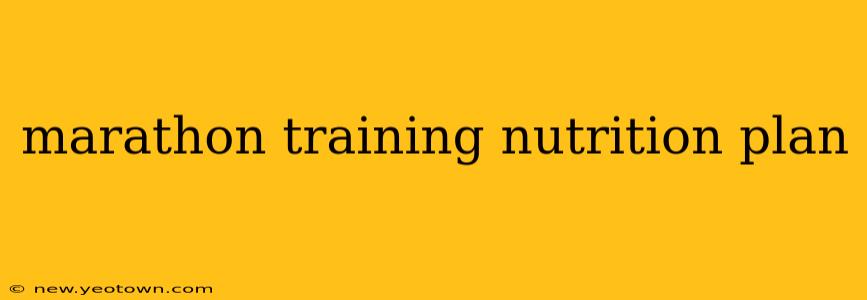The journey to conquering a marathon is a monumental undertaking, demanding not only rigorous training but also a meticulously planned nutrition strategy. It's not just about crossing the finish line; it's about feeling strong, energized, and capable throughout your entire training process and on race day. This isn't a generic diet; it's a personalized fueling plan tailored to the unique demands of marathon training. Think of your body as a high-performance machine – you wouldn't put regular gasoline in a race car, would you? This plan will guide you in fueling yours properly.
What are the key nutritional considerations for marathon training?
This is the cornerstone question. Marathon training places immense stress on your body, requiring a consistent intake of carbohydrates, proteins, and healthy fats to support energy levels, muscle repair, and overall well-being. Neglecting nutrition can lead to fatigue, injury, and ultimately, hindering your progress. We'll break down the specifics further, but remember: consistency is key. Don't strive for perfection, strive for consistent, healthy habits.
How many calories should I consume during marathon training?
This depends heavily on your individual needs, activity levels, and metabolism. However, you can expect a significant increase in caloric needs compared to your usual intake. A general guideline suggests adding 250-500 calories per day to your baseline, but consulting a registered dietitian or sports nutritionist is crucial for personalized guidance. They can help you determine your Basal Metabolic Rate (BMR) and adjust your caloric intake according to your training intensity and body composition.
What should I eat before a long run?
This is a critical aspect of your training. You need readily available energy sources that won't upset your stomach during your run. A good pre-run meal should be relatively light, easily digestible, and rich in carbohydrates. Good options include:
- Oatmeal with berries: Provides sustained energy release.
- Whole-wheat toast with banana: Simple carbohydrates for quick energy.
- Small portion of Greek yogurt with fruit: Protein and carbohydrates for sustained energy and muscle repair.
Avoid high-fat foods or anything that's likely to cause digestive distress.
What should I eat during a long run?
For runs exceeding 90 minutes, fueling during the run becomes essential to prevent hitting the dreaded "wall." Experiment with different options to find what works best for your body:
- Energy gels or chews: Convenient and readily absorbed.
- Sports drinks: Replenish electrolytes lost through sweat.
- Bananas or other easily digestible fruits: Provide natural sugars for energy.
Remember to practice your fueling strategy during training runs to avoid surprises on race day.
What should I eat after a long run?
Post-run nutrition is crucial for muscle recovery and replenishing glycogen stores. Focus on meals rich in carbohydrates and protein:
- Protein shake with fruit: Quick and easy way to replenish glycogen and protein.
- Chicken breast with brown rice and vegetables: Provides lean protein and complex carbohydrates.
- Sweet potato with salmon: Excellent source of carbohydrates and omega-3 fatty acids for reducing inflammation.
Consuming a recovery meal or snack within 30-60 minutes post-run is highly recommended.
How important is hydration during marathon training?
Hydration is paramount. Dehydration can significantly impair performance and even lead to serious health issues. Aim to drink plenty of water throughout the day, especially before, during, and after your runs. Consider adding electrolytes, especially during longer runs, to replace those lost through sweat.
What supplements should I consider for marathon training?
While a balanced diet should provide most of your nutritional needs, some runners may benefit from specific supplements. However, consult a doctor or registered dietitian before taking any supplements. Commonly considered supplements include:
- Iron: Important for oxygen transport.
- Electrolytes: Essential for fluid balance.
- Creatine: May improve muscle performance (though research is ongoing).
Remember, supplements should complement a healthy diet, not replace it.
This nutrition plan provides a framework; however, remember that every runner's needs are unique. Consulting with a registered dietitian or sports nutritionist is highly recommended to create a personalized plan that aligns with your individual needs, training schedule, and goals. Remember, proper nutrition is an integral part of your marathon journey – fuel your body, and your body will fuel your run!

